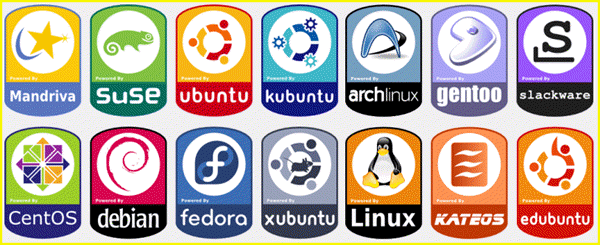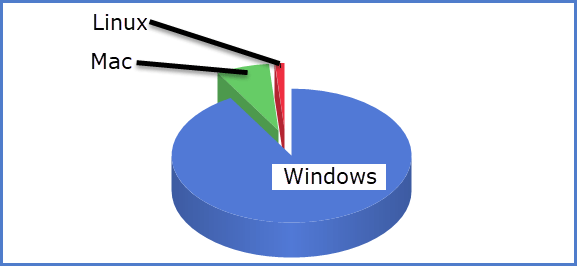First off I must emphasize that I am a Linux fan but, unfortunately, I do not believe it will ever be ready for prime time. The biggest problem, as I see it, is the lack of serious professional software. Sure, Linux is just fine if all the user wants to do is exchange email, surf the web, and normal day-to-day operations. Where it falls down is when special interest or professional software is required.
Take my case, for example, where all I really need is a professional screenshot capture tool with a decent editor built in for my writing. Some years back I downloaded the latest version of Ubuntu and was quite impressed, that is until I started to look for a decent screenshot capture program. At that time, “Shutter” was at the top of everyone’s list. I downloaded and installed Shutter and was immediately dismayed at just how primitive it was. I didn’t expect it to come close to professional screenshot capture tools — such as Snagit or Ashampoo Snap — but it was way under par even when compared to the freeware alternatives available for Windows.
Too Many Distros
I believe the problem starts right at the very beginning, as it would. Anyone with zero Linux experience looking to migrate from Windows must be completely confused at the sheer number of choices — over 600 distros with around 500 in active development. Then we have Debian-based, Knoppix-based, Ubuntu-based, Fedora-based, openSUSE-based, Arch-based, Gentoo-based, and on and on. Any wonder newcomers are totally at a loss? Even within the distros themselves, there are further choices to confuse the newbie. Check out these two descriptions sourced from MajorGeeks:
- Archman Linux is an Arch-based Linux distro. There are Xfce, KDE Plasma, Mate, Deepin, Gnome, Lxde, and Lxqt versions
- Nitrux is a Linux desktop distribution directly based on Ubuntu geared towards beginners. It uses the Calamares installer and includes NX Desktop and NX Firewall on top of the KDE Plasma 5 desktop environment and MauiKit Applications
Say what? I am somewhat familiar with Linux and that second one is mostly Greek to me; imagine what sort of effect descriptions such as these have on newbies. It’s true that Linux developers have tried hard in recent times to emulate the Windows environment, and with some success. However, the sheer quantity and diversion of distros is a huge put-off for any newbie looking to migrate. Windows users are moving from a choice of one to having to choose from over 600. And even when they manage to choose from a shortlist of recommended distros, the choices don’t stop there. Take the popular Mint distro for example. Go to the Mint download page and you’re immediately confronted with even more choices, between Cinnamon, MATE, and Xfce.
I guess it could be argued that variety is a good thing but, in this case, I believe it is just too much, overkill if you will. Take someone into a cake shop with over 600 delicacies to choose from and you’d end up with one confused customer having a very difficult time trying to decide. Take that same someone into a cake shop with just three delicacies to choose from and I guarantee they’d make their choice in no time flat.
Insufficient Market Share
It’s a catch 22 situation that Linux does not command enough of a market share to warrant hardware manufacturers and software developers investing in the platform. When these developers invest in Windows they are developing a one-shoe-fits-all program that they know will be available to billions of users. On the other hand, developing for Linux, with its measly market penetration shared among over 600 distros with differing baselines, why would they bother? Well, they wouldn’t and most don’t, because it’s simply not financially viable.
In order for Linux to become mainstream, the first thing developers need to do is get their heads together and produce one almighty distro, the best from the best, with maybe 2- 3 desktop environments to choose from. Because, until such time as a single Linux distro commands a decent share of the desktop market, things are never going to change. Linux will never reach the standard to satisfy gamers, professionals, and those users with special interests/needs until such time as the major hardware manufacturers and software developers get on board, simple as that.
BOTTOM LINE:
As I said at the beginning, I am a Linux fan, I really am. However, while I fully appreciate the original concept behind Linux, without a complete change of direction it is surely destined to continue floundering in the mire.
Now, I know some Linux users are probably going to take me to task over the content of this article. Go for it, I can take it, hit me in the comments. 🙂
—



HI Jim
Not much to chose from when trying to find a 32bit distro. I am
currently running Mageia 8 on my old Acer desktop. Maybe not
mainstream, but at least works and gives me internet access. It is
in dual boot with Windows Vista Basic.
Hey Daniel – Your comment contains two surprises:
1) You have a laptop limited to 32-bit that is still working- it must be ancient. 🙂
2) That Vista will run on that old laptop. Vista was the first Windows OS that demanded more advanced hardware which upset many users at the time.
Good one mate!
Hi Jim
It is an old Acer Aspire Desktop, not a laptop, ancient, yes, but
it still works and is able to do what I want.
Maybe not Desktop Versions but in Industry Linux Servers are running the biggest businesses out there. When I was at Global Network Services AT&T/Lucent/Avaya (now retired) all of our Global Network Call Centre, Telecommunications, Voice Mail, Telephony Servers were & still are all Linux.
Wiki- search “List of Linux adopters”
Fortune Business Insights Article- https://www.fortunebusinessinsights.com/linux-operating-system-market-103037
I appreciate what you are saying and am well aware of the situation regarding Linux servers, however…
The entire article is discussing Linux on desktop (for home users) and the fact that it seems incapable of making any impact on the desktop market share. In this context, Linux on servers is entirely irrelevant.
I agree that as is Linux will not be a mainstream system for the majority of “Desktop User’s “.
As much as I consider an alternative system to Microsoft Windows I find that I must maintain using it on my desktop for certain applications and uses.
I do use Linux Mint on an older laptop and as a dual boot with Windows on an older desktop
Hey Bern,
Yours is a very common scenario – needing to keep a copy of Windows for certain applications. This is the number one reason why users are unable to migrate completely to Linux and abandon Windows altogether.
“mostly Greek” doesn’t sound hard to me because I’m Greek, but my problem with Linux has always been the lack of proper Greek support. For example, when I switch to Greek layout in Linux, LibreOffice doesn’t understand the change of language and still considers it as English. Reports have been filed years ago, but LibreOffice developers say it’s a Linux problem.
My major issue with Linux on desktop boils down to issue #4 on this (seemingly unrelated) blog post: https://blog.wolfram.com/2019/04/02/why-wolfram-tech-isnt-open-source-a-dozen-reasons/
Still, Linux now is much better to what it was, so I still try it every 3 years or so.
I agree with you. After 25 years of using microsoft, they had to become tyranical perverts before I finally switched to Linuxmint Cimmanon desktop. If you don’t have some technical experience, plus be willing to shade tree with an entire FREE programs and operating system, Linux is not for you. You will have to suffer the draconian dictator overlords of Microsoft. Living free and independent is hard work.
Do I denote a hint of sarcasm in your comment?
I’ve never been afraid of hard work but for me using Linux is not so much hard work as an impossibility because of the lack of specialist software I need. This is a very common complaint among users looking to migrate from Windows to Linux and many more users would be able to leave the “draconian dictator overlords” if only the hardware and software developers would get on board – a point I made in the article.
I do agree with what you are saying, by the way. 🙂
I’ve always been put off Linux because apparently even the simple ones require some use of the command line, or is this a common myth?
But your right, if you can’t get what you need, it reduces its usage. It’s the same reason I think Windows Phone never really picked up – I never opened one but loved the idea of being able to go from one device i.e my desktop to my phone and continue what I was doing. Problem is people become reliant on specific apps, and Windows just couldn’t offer what Android or iOS had
“apparently even the simple ones require some use of the command line, or is this a common myth?”
That used to be the case Peter but these days the more popular Linux distros – such as Mint, Ubuntu, and Zorin – are all pretty much GUI (Graphical User Interface) driven with very little need to use the Terminal (command line). Very similar to Windows.
You are 100% correct about the Windows Phone, Microsoft could not get the app developers on board and that spelled the beginning of the end. Over the years, many a great piece of hardware has bitten the dust because of lack of software support.
Hi Jim
I know DCT readers do not really care for Linux, but if you want to have a look at my
latest Mageia 8 install, well here is a link.
https://itsfoss.community/t/moved-my-acer-desktop-back-to-mageia/8586/3
Readers at Itsfoss are a little more opened minded about Linux.
Imagine, you are VP IT in a bigger company. Will you have the guts for whatever reason (maybe cost) to roll out Linux to the desktop, and then everyday hear: “In Windows this would not be a problem”?
Imagine, you are VP Sales with a computer manufacturer and you have to decide to ship your computers with Linux preinstalled. Are you will to stand internal critics, who claime, with Windows preinstalled (like competition ist doing), sales would be much higher?
Imagine you are responsible for IT in schools. Will you dare to force the teachers into using Linux, if for them Windows is also “free software”? Are you willing to listen their complaints every day?
And even if you did all this, how will you convince Adobe and others to port to Linux??
On top of that and despite huge improvements on the Linux desktop: Every other week I have to spend time researching something that got broken. And that researching is only for computer nerds.
It’s never about the OS as much as it is what applications run on the OS. Personally, I have nothing against Linux distro’s or any other operating system. Clearly what is important to end users in a OS is whether they can run the applications they use. Nobody ever wants to switch OS and find out their familiar apps won’t work or don’t even have a suitable replacement. Many apps on Linux are dreadfully lacking compared to their licensed Windows developed apps. I see many advantages in Linux but still there are some roadblocks for many to even consider moving from Windows or Mac OS considering those two OS have many apps that work on both platforms.
Absolutely John. A point I made in the article more than once.